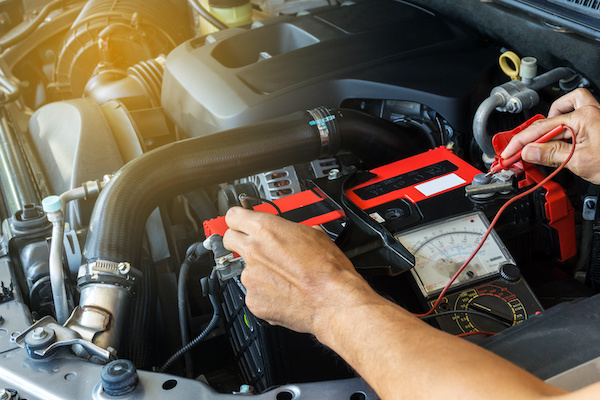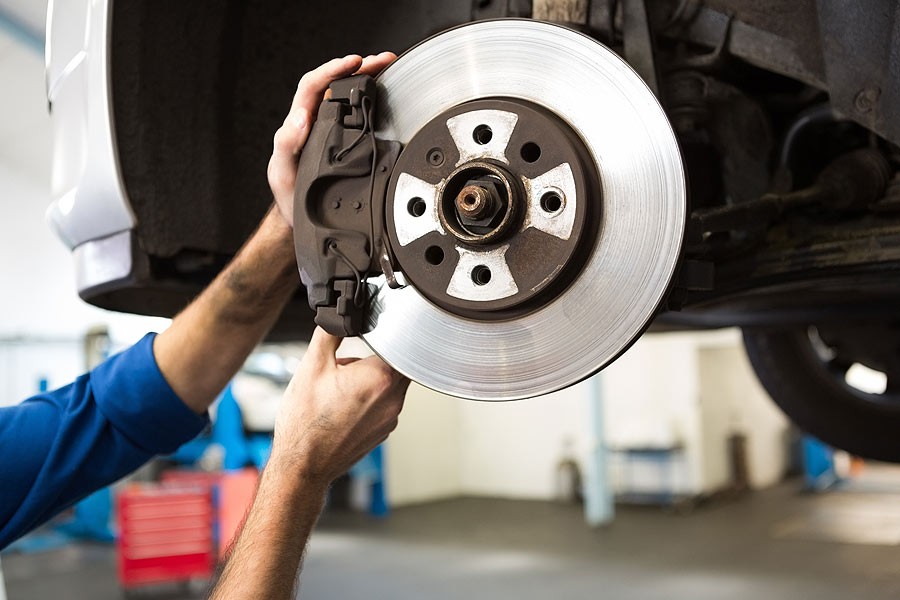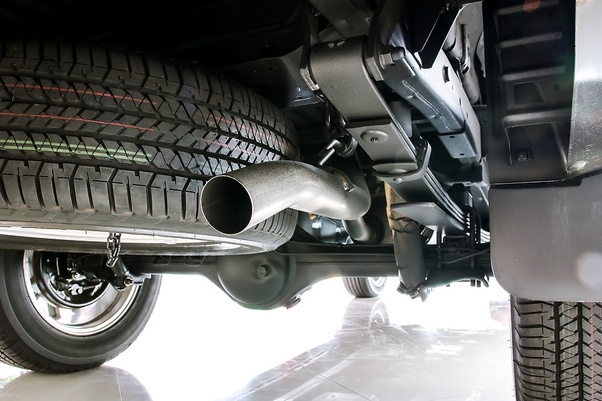the introduction:
In the world of power and performance, the role of the car battery clearly appears as one of the vital elements that directly affects performance
The vehicle and its ability to run smoothly. This small part that lies in a dark corner of the car's engine is considered a key
A truly reliable driving experience.
The car battery has many important aspects, as it is not just a source for starting the engine, but rather a controlling element in the system
Lighting, provides energy for the electronics inside the car, and contributes to the operation of various devices. So, many people wonder: what is it?
The reasons that may lead to car battery failure and how early detection and proper repair can limit these
the problem?
We will explain the details of this important aspect of the automotive world, as we will look in depth at the signs and causes of car battery failure.
We will highlight effective methods for early detection and the importance of proper battery repair to maintain the car’s performance
At his best.
What is the importance of the car battery?
The car battery carries great importance in the process of operating the car and ensuring the safety and efficiency of its systems. Here are some points that
The importance of this element is highlighted:
Starting the engine: A car's battery provides the electrical energy needed to start the engine, making it essential for mobility
And use the car.
Operating lighting and electrical appliances: The car battery provides energy for lighting and electrical appliances inside the car.
Such as signals, radio, and power windows.
Saving energy when the engine is stopped: While the engine is stopped, the car relies on its battery to operate the electrical systems
And electronic, which maintains functions such as the alarm system and central locking.
Improving car performance: A healthy battery contributes to improving car performance and ensuring that all systems work effectively.
Endurance in harsh weather conditions: Car batteries are designed to withstand temperature fluctuations and be reliable
In various weather conditions.
Simply put, the car battery is considered the main nerve of the car’s electrical system, and understanding its importance contributes to maintaining...
Safety and efficiency of the vehicle.
What are the types of batteries and how do you choose the right battery for your car?
There are many types of car batteries available, and choosing the right type depends on the car's needs and use.
Here are some of the main types and some tips on how to choose the right battery:
This type is the most common and least expensive as it requires: 1. Traditional lead acid batteries:
Maintaining fluid level and regular maintenance.
They contain a dense gel that prevents liquid leakage, making them less maintenance-intensive (Gel Batteries): 2. Gel batteries
And able to handle vibrations better.
In order to choose the right battery, you should take into consideration the following factors:
Determines the battery power. :(Ah) 1. Ampere
Cars usually need 12 volt batteries. :(Voltage) 2. Voltage
3. Size and Dimensions: Make sure the battery fits in its default location
4. Choose the type that suits your use and matches the requirements of the car.
By choosing the right battery, you can improve your car's performance and ensure smooth operation.
Common problems with batteries:
Common problems that a car battery may encounter include:
● Battery discharge: Occurs when lights or electrical appliances are left on without the engine running for a period of
long.
● Oxidation on the battery electrodes: occurs as a result of overcharging or misuse, which affects the battery’s performance.
● Cell damage: as a result of repeated deep discharge or excessive current.
●Liquid leakage: This may occur as a result of damaged cells or a loose cap, leading to damage to the battery.
● Loss of charge: It can be caused by damage to the alternator or voltage regulator, which prevents the battery from being charged properly
correct.
● Damage to cables or connectors: This can lead to loss of connection and inefficient operation.
●Ultimate battery life: Over time, batteries lose their effectiveness and need to be replaced
Corrosion of internal blocks: occurs due to prolonged use or harsh environmental conditions.
Symptom analysis: When is your battery at risk?
Symptom analysis plays an important role in early detection of any problems that may indicate danger to the car battery. To you
Some symptoms you can watch for:
Difficulty starting: If you are having difficulty starting the engine, this may be a sign of a weak battery
The Car.
Slow start-up: If you notice a gradual start-up slowness over time, this could be the result of a loss of
Battery efficiency.
Dashboard Warning Light Is On: When the battery warning light appears on the dashboard, this indicates a problem
Possible in the charging system or the battery itself.
Weak lighting power: If you notice weak lighting power, especially when using large lights, this may be an indication of...
The car battery is affected.
Fluctuation in the performance of electrical appliances: If you notice a fluctuation in the performance of electrical appliances such as electric windows or the radio,
This may be due to a weak battery.
The smell of sulfur gas: If you smell a smell similar to sulfur gas near the battery, there may be leaks and should be checked
immediately.
Cracks or bulges appear: If you notice cracks or bulges in the outer cover of the battery, this could indicate
Internal problem.
Slippery battery base: If your car battery moves easily when you press it by hand, you may need to secure it
Better.
If you notice any of these symptoms, it is necessary to periodically check the battery and electrical system to check their condition
And take the necessary measures.
Preventive measures: How to avoid car battery failure and how to extend its life?
To avoid car battery failure and extend its lifespan, you can follow these preventive measures:
1. Run the engine regularly, even if the car is not used on a daily basis. This helps maintain charge
the battery.
2. Try to avoid operating the car’s electrical appliances without running the engine for long periods, as this can lead to damage
To deep discharge the battery.
3. If you do not use the car regularly, use the battery charger to maintain the charge level.
4. Check the charging system regularly to ensure that the alternator and voltage regulator are working properly.
5. Clean the battery electrodes from build-up and corrosion using a wire brush.
6. Make sure that the battery is securely fastened and is not loose, as excessive vibration can damage the battery
7. Try to avoid leaving the car in extreme temperatures, as extreme high or low temperatures may affect performance
the battery.
8. Have the electrical system checked regularly at the service shop to ensure that all parts are working properly.
By taking these preventative measures, you can preserve your car battery and improve its chances of staying in good condition longer.
Steps that can be taken to repair your car battery:
Wear gloves and protective glasses to avoid exposure to liquids or chemicals. ●
Make sure to turn off the engine and disconnect the negative battery cable (-) first to avoid electrical problems. ●
Use a wire brush to clean the battery electrodes from oxidation. ●
Use a voltmeter to measure the battery voltage and make sure it is within the normal operating range. ●
Use a battery charger to properly charge the battery. ● Follow the charger's instructions and make sure the process is finished
Shipping safely.
After charging, use a voltmeter to check the new voltages. ●
Start the engine and check that the voltage changes normally. ●
Connect the negative battery cable (-) first, then the positive battery cable (+). ●
Start the engine and check that the electrical system is operating normally. ●
Use a voltmeter to measure the battery voltage during operation and ensure that it increases normally. ●
If charging problems persist, it is preferable to have the charging system checked at the store or service workshop.
Conclusion:
In conclusion of this topic about the car battery and how to maintain it, it can be said that taking care of the battery plays a role
Crucial in ensuring the vehicle's performance and reducing the chances of its failure. Take preventive measures, such as running the engine regularly and checking
Electrical system, keeping the battery clean, you can enhance the life of the battery and avoid problems related to its failure.
Therefore, we always recommend taking care of the battery as an essential part of routine car maintenance. If you are facing any problem or doubt
Battery condition, regular checking and prompt attention can help avoid major problems.
DevsMinds






Leave a Comment